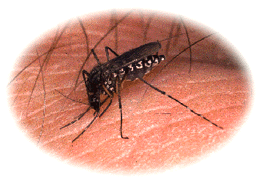

Arbovirus Surveillance Program

What is St. Louis Encephalitis?
St. Louis Encephalitis (SLE) is a disease caused by a virus that is transmitted to people by certain mosquitoes.
What is West Nile Encephalitis?
West Nile encephalitis is an infection of the brain caused by West Nile virus, a flavivirus commonly found in Africa, West Asia, and the Middle East. It is closely related to St. Louis encephalitis virus found in the United States.
In an average year, Florida has from one to 10 cases of SLE. Several large outbreaks involving as many as 200 cases have occurred in Florida in recent decades. The Hendry County health department keeps two chicken flocks and monitors these chickens for evidence of exposure to SLEand WNV. The chickens make good sentinels because they do not get sick from SLEor WNV. Chickens or other birds cannot transmit the virus directly to people.
The chickens are bled once every two weeks during the months of June through October. Blood samples are processed and tested in the Department of Health’s laboratory in Tampa.
Mosquitoes become infected when they feed on infected birds in the wild, which may circulate the virus in their blood for a few days. Infected mosquitoes can then transmit West Nile virus and St. Louis Encephalitis to humans and animals while biting to take blood. The virus is located in the mosquito's salivary glands. During blood feeding, the virus may be injected into the animal or human, where it may multiply, possibly causing illness.
Even in areas where mosquitoes do carry the virus, very few mosquitoes—much less than 1%—are infected. If the mosquito is infected, less than 1% of people who get bitten and become infected will get severely ill. The chances you will become severely ill from any one mosquito bite are extremely small.

What can you do to prevent infection?
Prevention is the key. The best way to avoid infection is to avoid getting mosquito bites.
- Avoid outdoor activities during dusk and dawn hours when mosquitoes are most active.
- If you must be outdoors, cover up by wearing shoes, socks, long pants and long-sleeved shirts, and use mosquito repellent on skin that will be exposed.
- Remove or empty water in old tires, tin cans, buckets, drums, bottles or any other containers. Be sure to check clogged gutters and flat roofs that may have poor drainage. Make sure cisterns, cesspools, septic tanks, fire barrels, rain barrels and trash containers are covered tightly with a lid or with 16-mesh screen.
- Empty plastic wading pools at least once a week and store indoors when not in use.
- Change the water in bird baths and plant pots or drip trays at least once each week.
- Store boats covered or upside down, or remove rainwater weekly.
- Level the ground around your home so water can run off and not collect in low spots. Fill in holes or depressions near your home that accumulate water.
- Fill in tree rot holes and hollow stumps that hold water.
- If you have an ornamental water garden, stock it with mosquito-eating fish (e.g., minnows, "mosquito fish," goldfish or guppies).
- Repair screening on windows, doors, porches and patios.
- Some mosquito control methods are not very effective. Bug zappers are not effective in controlling biting mosquitoes. Various birds and bats will eat mosquitoes, but there is little scientific evidence that this reduces mosquitoes around homes.





